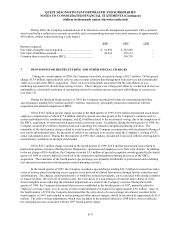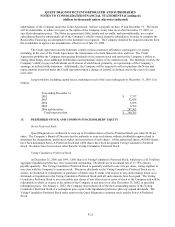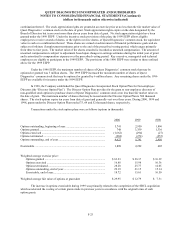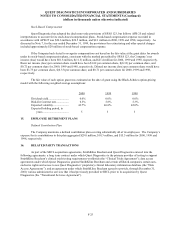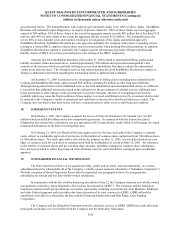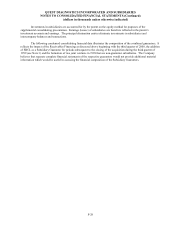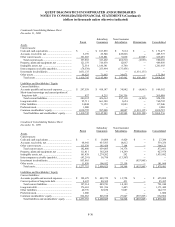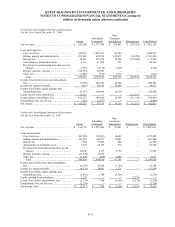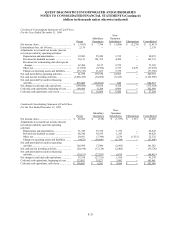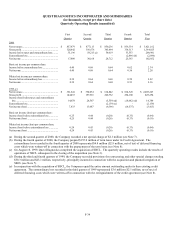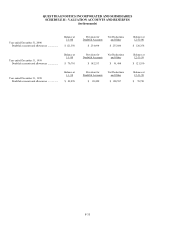Quest Diagnostics 2000 Annual Report Download - page 97
Download and view the complete annual report
Please find page 97 of the 2000 Quest Diagnostics annual report below. You can navigate through the pages in the report by either clicking on the pages listed below, or by using the keyword search tool below to find specific information within the annual report.QUEST DIAGNOSTICS INCORPORATED AND SUBSIDIARIES
NOTES TO CONSOLIDATED FINANCIAL STATEMENTS (Continued)
(dollars in thousands unless otherwise indicated)
F-27
False Claims Act and has received notices of private claims relating to billing issues similar to those that were the subject
of prior settlements with various governmental payers. Several of the cases involve the operations of SBCL prior to the
closing of the SBCL acquisition.
In March 1997, a former subsidiary of Damon Corporation (“Damon”), an independent clinical laboratory
acquired by Corning and contributed to Quest Diagnostics in 1993, was served a complaint in a purported class action.
Quest Diagnostics was added to the complaint by the plaintiffs in August 1999. The complaint asserted claims relating to
private reimbursement of billings that were similar to those that were part of a prior government settlement. The
Company entered into a settlement agreement which received the final approval of the court on July 14, 2000. The final
settlement releases the Company and all of its subsidiaries, other than SBCL, from potential private claims related to the
reimbursement of billings that were the subject of the lawsuit. During the second quarter of 2000, the Company recorded
a reduction in reserves attributable to the favorable resolution of this matter (see Note 7).
In December 2000, the Company entered into a settlement agreement with the federal government and certain
state government healthcare programs for approximately $13 million, primarily relating to prior billing and marketing
practices at several former facilities of Nichols Institute that occurred prior to the Company’s acquisition of Nichols
Institute.
In April 1998, the Company entered into a settlement agreement with the U.S. Attorney’s Office in Baltimore
for approximately $7 million related to the billing of certain tests performed for which the Company had incomplete or
missing order forms from the physician. The occurrence of this practice was relatively rare and was engaged in primarily
to preserve the integrity of test results from specimens subject to rapid deterioration. In August 1998, the Company
entered into a settlement agreement with the Office of Inspector General of the Department of Health and Human
Services for approximately $15 million related to overcharges for medically unnecessary testing for end stage renal
dialysis patients.
The settlements do not constitute an admission with respect to any issue arising from these actions. These
settlements were covered by the indemnification from Corning discussed below and were fully reserved for.
Corning has agreed to indemnify the Company against all monetary settlements for any governmental claims
relating to the billing practices of the Company and its predecessors based on investigations that were pending on
December 31, 1996. Corning also agreed to indemnify the Company in respect of private claims relating to indemnified
or previously settled government claims that alleged overbillings by Quest Diagnostics or any of its existing subsidiaries
for services provided before January 1, 1997. Corning will indemnify Quest Diagnostics in respect of private claims for
50% of the aggregate of all judgment or settlement payments made by December 31, 2001 that exceed $42 million. The
50% share will be limited to a total amount of $25 million and will be reduced to take into account any deductions or tax
benefits realized by Quest Diagnostics. At December 31, 2000 and 1999, the receivable from Corning, which was
classified in prepaid expenses and other current assets, totaled $8.1 million and $14.0 million, respectively. The
receivable from Corning represented management's best estimate of amounts which are probable of being received from
Corning to satisfy the remaining indemnified governmental claims on an after-tax basis. In accordance with the
indemnity described above, the Company received $8.1 million from Corning in January 2001 in connection with the
Nichols Institute settlement which is discussed above.
Similar to Quest Diagnostics, SBCL has entered into settlement agreements with various governmental agencies
and private payers primarily relating to its prior billing and marketing practices. Effective in 1997, SBCL and the U.S.
government and various states reached a settlement with respect to the government’s civil and administrative claims.
SBCL is also responding to claims from private payers relating to billing and marketing issues similar to those that were
the subject of the settlement with the government. The claims include ten purported class actions filed in various
jurisdictions in the United States and two non-class action complaints by a number of insurance companies. Nine of the
purported class actions have been consolidated into one complaint, which has been consolidated with one of the insurers’
suits for pre-trial proceedings.
SmithKline Beecham has agreed to indemnify Quest Diagnostics, on an after-tax basis, against monetary
payments for governmental claims or investigations relating to the billing practices of SBCL that had been settled before
or were pending as of the closing date of the SBCL acquisition. SmithKline Beecham has also agreed to indemnify Quest
Diagnostics, on an after-tax basis, against monetary payments to private payers, relating to or arising out of the


